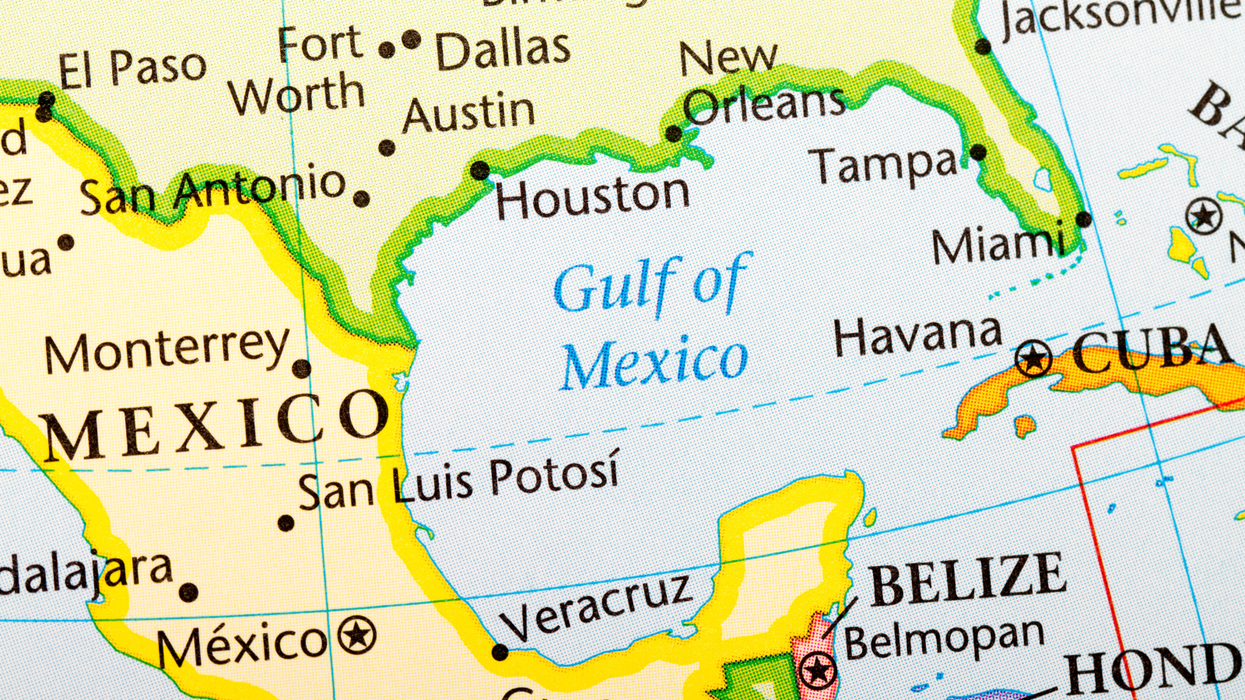The Fulcrum introduces Congress Bill Spotlight, a weekly report by Jesse Rifkin, focusing on the noteworthy legislation of the thousands introduced in Congress. Rifkin has written about Congress for years, and now he's dissecting the most interesting bills you need to know about, but that often don't get the right news coverage.
The potential rebrand echoes the 2003-era rebranding of French fries as “freedom fries.”
The Bill
A new bill would officially rename the Gulf of Mexico as the “Gulf of America.”
At least in the United States, that is. Mexico itself, not being subject to U.S. laws, could continue to call the Gulf whatever it wants. So could every other country in the world—not to mention international mapmaking and cartography organizations.
Indeed, even in the U.S., many people would likely continue to call it the Gulf of Mexico just out of habit, perhaps for years to come. The bill would only change the name in official documents, which are specified to include any “law, map, regulation, document, paper, or other record of the United States.”
The House bill was introduced on January 9 by Rep. Marjorie Taylor Greene (R-GA14). The bill does not appear to have a title.
Context
The body of water off the U.S. southeast coast borders five states to its north —Alabama, Florida, Louisiana, Mississippi, and Texas—plus Mexico to its west and Cuba to its southeast.
The name “Gulf of Mexico” was first used on a map in 1550. Even a few alternate names used long ago never included “Gulf of America”; instead, other names that never quite caught on included the “Gulf of Florida” and “Gulf of Cortés.”
Indeed, a Mississippi Democratic state representative’s 2012 proposal to rename it the “Gulf of America” was satirical, meant to spoof Republicans’ displays of hyperpatriotism.
Yet, President Donald Trump floated the idea with complete seriousness at a January press conference as president-elect. On his first day in office, Trump signed an executive order changing two geographical names: the Gulf of Mexico to the Gulf of America, plus Alaska’s Mount Denali to Mount McKinley.
While the executive order encouraged the changes to be implemented within 30 days, Florida’s own state government under Gov. Ron DeSantis did so within hours.
But even Trump’s executive order acknowledged that the decree was only “guidance” because “congressional action is required to establish a renaming in public law.” Hence, this bill.
What Supporters Say
Supporters argue that it’s only fair that a country should name its bordering body of water after itself, at least for domestic purposes.
“The American people are footing the bill to protect and secure the maritime waterways for commerce to be conducted. Our U.S. armed forces protect the area from any military threats from foreign countries,” Rep. Greene said in a press release. (That claim is true: the Coast Guard patrols the area.) “It’s our Gulf. The rightful name is the Gulf of America.”
What Opponents Say
Trump’s simultaneous name change from Mount Denali to Mount McKinley is controversial for removing the original Native Alaskan moniker, to one instead honoring a white president who never even visited Alaska.
By contrast, the “Gulf” name change isn’t so controversial on its actual merits. Rather, opponents say it’s a waste of time and a cheap trick to score political points with Trump’s base.
“House Democrats believe that we are not sent to Washington to… rename the Gulf of Mexico,” House Democratic Leader Rep. Hakeem Jeffries (D-NY8) said at a press conference. “We were sent to Washington to lower the high cost of living in the United States of America.”
Mexico’s own political leader dismissed the issue as irrelevant in her own country.
“He says that he will call it the Gulf of America,” Mexico’s President Claudia Sheinbaum said. “For us and for the entire world it will continue to be called the Gulf of Mexico.” She also sarcastically suggested renaming the entire U.S. as “Mexican America” in response.
Odds of Passage
The bill has attracted 29 cosponsors, all Republicans. It now awaits a potential vote in the House Foreign Affairs Committee, controlled by Republicans.
No Senate companion version appears to have been introduced yet.
SUGGESTION: Congress Bill Spotlight: constitutional amendment letting Trump be elected to a third term
 President-Elect Donald Trump speaks during a victory rally at the Capital One Arena on January 19, 2025 in Washington, DC.
(Photo by Kevin Carter/Getty Images)
President-Elect Donald Trump speaks during a victory rally at the Capital One Arena on January 19, 2025 in Washington, DC.
(Photo by Kevin Carter/Getty Images)
Jesse Rifkin is a freelance journalist with the Fulcrum. Don’t miss his weekly report, Congress Bill Spotlight, every Friday on the Fulcrum. Rifkin’s writings about politics and Congress have been published in the Washington Post, Politico, Roll Call, Los Angeles Times, CNN Opinion, GovTrack, and USA Today.




















Trump & Hegseth gave Mark Kelly a huge 2028 gift